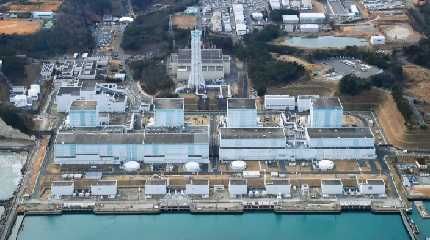
BEIJING, April 14 (Xinhua) -- Japan continued to push forward with its plan to discharge radioactive wastewater from the crippled Fukushima Daiichi nuclear power plant into the sea despite a host of local and international opposition.
"The contaminated water released into the ocean will spread across the entire Pacific Ocean in 10 years and affect almost all of our sea," said South Korean Rep. Seo Sam-seok at a forum on Monday to seek ways of cooperating with neighboring countries to tackle Japan's plan to dump the nuclear wastewater next spring.
"Marine pollution will be inevitable, so the government and political circles should proactively act for the safety of the people," he added.
Civic activists in South Korea also voiced their concerns through protests. The Pohang Citizens Behavior, composed of six civic groups and residents, held a protest rally against Japan's plan last week. The port city is forecast to be one of the hardest-hit fishing areas by the polluted water.
The current Moon Jae-in government has banned imports of marine products caught in Japanese waters near Fukushima prefecture.
The Japanese government's decision would cause danger to the safety of the maritime environment of the neighboring countries, said Anna Malindog-Uy, researcher of Philippine-BRICS Strategic Studies, noting the decision was made "unilaterally without sufficient consultation with neighboring countries."
"If something goes wrong with the sad plan, developing countries like the Philippines, like my country, we're surely be adversely affected and left on their own to suffer the negative consequences," she added.
"Japan should think twice before proceeding with its plan and prudently consult with countries that will directly be affected by such a decision," the researcher said.
The wastewater cannot be stripped of the radioactive element tritium by the two treatment methods used in Fukushima, namely filtering and chemical treatment, Maria Rosa Beccia, chemist and researcher at Cote d'Azur University, told La Croix newspaper.
Cavince Adhere, a Kenya-based international relations scholar, pointed out that numerous scientific studies have linked radioactive elements contained in the water to public health risks.
"Given the interconnectedness of the world waterways and food systems, the move by Japan could see millions of people in faraway spaces, including Kenya, affected," he said.
"Japan is exposing the world to multiple and far-reaching consequences with the nuclear discharge," he added.
It has been a year since Japan unilaterally announced its decision to dump radioactive wastewater accumulated at the crisis-hit Fukushima Daiichi nuclear power plant into the Pacific Ocean.
In December 2021, Tokyo Electric Power Company, the plant's operator, submitted an application to Japan's Nuclear Regulation Authority with a detailed plan for discharging the contaminated water.
The controversial plan is proposed to begin in the spring of 2023.
The handling of the nuclear-contaminated water from Fukushima is not a private matter for Japan, said Chinese foreign ministry spokesperson Zhao Lijian. Instead, it bears on the marine environment and public health of the whole world.
Zhao added that Japan should heed the appeals of neighboring countries and the international community and rescind its decision to dump the water into the sea.
"It mustn't wantonly start the ocean discharge before reaching consensus with stakeholders and relevant international institutions through full consultations," Zhao said.




